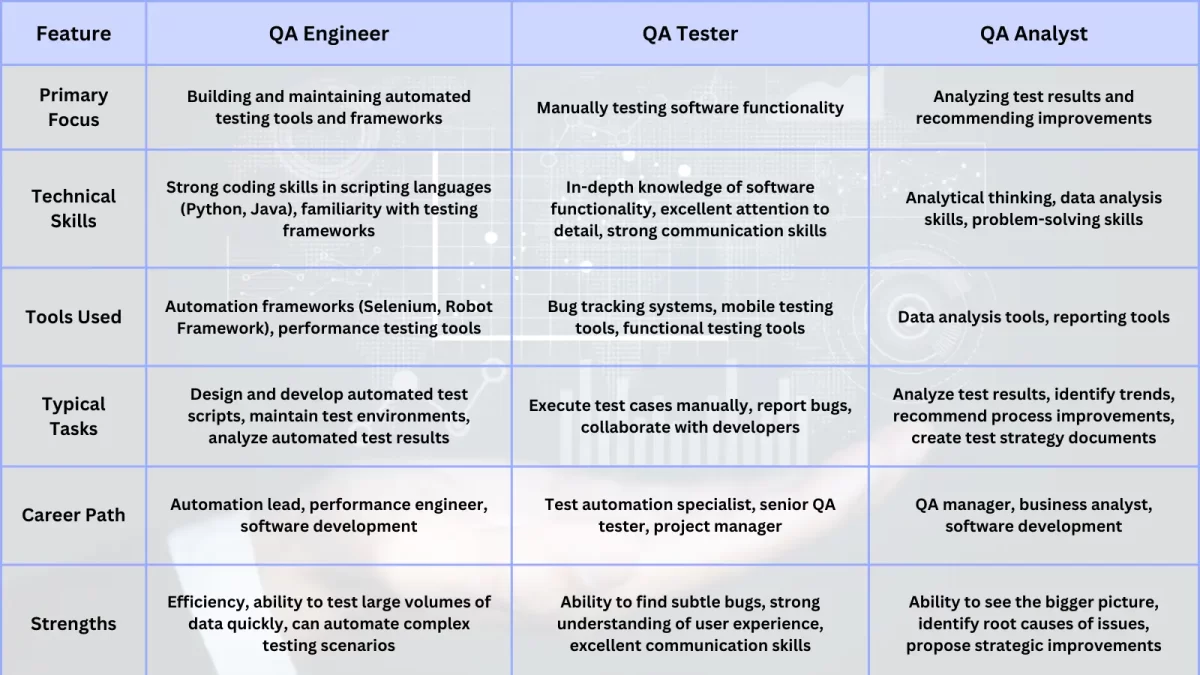hello! Software development is a complex field and ensuring quality is an important part of it. But there are so many job titles like “QA engineer,” “QA tester,” and “QA analyst” that it can be quite confusing.
So I am here to help you! Simply put, quality assurance professionals are responsible for ensuring the quality of software products. However, it can be difficult to understand because each position has different responsibilities. But don’t worry. I’m here to guide you through the exciting world of software quality assurance. Together we will help you understand these titles and understand the differences between them.
QA Engineer: Building a Fortress of Quality
Imagine a software engineer building a magnificent castle. Now imagine a quality assurance engineer meticulously inspecting the walls, testing the drawbridges and making sure they can withstand any attack. That’s what these people do! They have the following technical expertise and often also have coding knowledge:
- Test Design and Automation: They create sophisticated test cases and build tools to simulate user tasks to ensure that the software works flawlessly.
- Debug and fix bugs: Like chivalrous defenders, they identify and eliminate any defects or errors that may hinder performance.
- Contribute to development: They work closely with software engineers to suggest improvements and ensure the final product is built with quality in mind.
QA Tester: Tireless Explorer
Think of quality assurance testers as brave adventurers venturing into uncharted software territory. They meticulously use every feature, push buttons, explore every nook and cranny, and report every anomaly they find. These tasks include:
- Run manual tests: While QA engineers often automate, testers manually explore software to try out different scenarios and features.
- Report bug: Document any issues you find, as the technician returns with news of potential weaknesses.
- Provide feedback: They share their experiences with the development team to help them understand how users interact with the software.
QA Analyst: The Sherlock Holmes of Software
Imagine a detective meticulously analyzing clues to solve a mystery. This is the essence of a quality assurance analyst! They use their keen minds to:
- Define your test strategy: They create a roadmap to thoroughly test every aspect of the software.
- Analysis of test results: Interpret test data like deciphering secret messages to identify trends and areas for improvement.
- Improve your testing process: They continually evaluate and improve the testing methods used to ensure they remain effective and efficient.
QA engineer big QA tester big QA Analyst
It’s not always black and white. Roles may overlap and individuals may have skills across a variety of areas. But remember:
- Quality Assurance Engineer: Building and running tests often comes from a coding background.
- Warranty Tester: Manually explore and test software functionality.
- Warranty Analyst: Design testing strategies and analyze results.


Synergy effect:
These roles work in tandem with each other. Engineers create tools and processes, testers execute them, and analysts gain insights to improve the overall QA system. Each role is valuable, and their combined efforts ensure comprehensive and effective software quality assurance.
Which role is right for you?
If you love building and automating, the Quality Assurance Engineer path may be ideal for you. If you have a keen eye for detail and love testing, becoming a quality assurance tester could be your calling. If you’re good at analysis and problem solving, a QA Analyst role may be a perfect fit for you.
Want to know more?
- Check out our online resources and courses on QA testing.
- Connect with QA experts on social media or online forums.
- Consider an internship or volunteer opportunity in QA to gain real-world experience.
Ultimately, they all work together as one team, with the mission to ensure that the software they use is bug-free, stable, and provides the best experience possible!
remember: This is a glimpse into the exciting world of QA. Each role offers unique opportunities to contribute to the software development process. So, if you are curious, analytical and passionate about quality, dig deeper and find out which QA path could be your perfect exploration!


